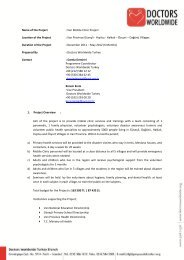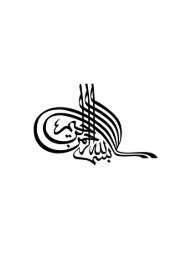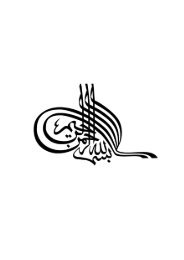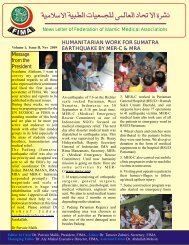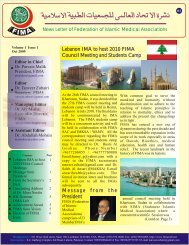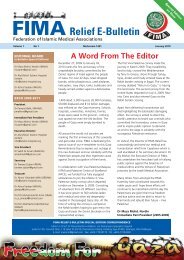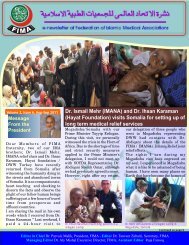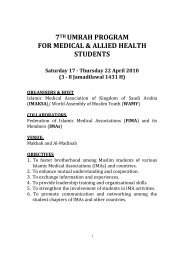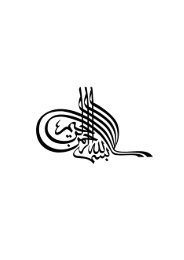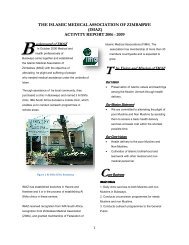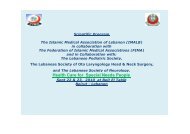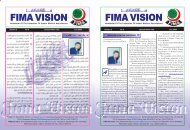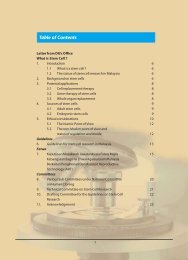FIMA Year Book 2009 - Federation of Islamic Medical Associations
FIMA Year Book 2009 - Federation of Islamic Medical Associations
FIMA Year Book 2009 - Federation of Islamic Medical Associations
Create successful ePaper yourself
Turn your PDF publications into a flip-book with our unique Google optimized e-Paper software.
Ethics <strong>of</strong> Clinical ResearchGuideline 12. Equitable Distribution<strong>of</strong> Burdens and Benefits in theSelection <strong>of</strong> Groups <strong>of</strong> Subjects inResearchThis guideline is again in harmony with<strong>Islamic</strong> law which calls for justice inall affairs <strong>of</strong> life. (23) So, it is unfair thatparticipants in a study share in theburdens i.e. the potential side effectsor other hardships but they do notshare in the benefits when a successfulintervention is achieved but is notmade available to them.Guideline 13. Research InvolvingVulnerable PersonsThese include persons with limitedcapacities or freedom to consentor decline to consent. They may bementally incapacitated, elderly peoplewho developed varying degrees <strong>of</strong>dementia, residents <strong>of</strong> nursing homes,people receiving welfare benefits, theunemployed, patients in emergencyrooms, some ethnic or racial minoritiesgroups, homeless persons, nomads,refugees, prisoners and patientswith incurable diseases. Junior orsubordinate members <strong>of</strong> hierarchicalgroups, for example medical andnursing students, employees <strong>of</strong>pharmaceutical companies andmembers <strong>of</strong> the armed forces or police,are all considered vulnerable groups.Their agreement to volunteer maybe influenced by the expectation <strong>of</strong>preferential treatment if they agree andretaliation if they refuse.Ethical justifications for theinvolvement <strong>of</strong> these vulnerable groupsare:1. The research could not be carried outequally well with less vulnerablepersons.2. The research will lead to improvedtreatment <strong>of</strong> health problemsunique to the vulnerable class.3. They are assured that they will havereasonable access to any productthat comes out <strong>of</strong> the research4. The risk is minimal.5. The agreement to participate issupplanted by the permission <strong>of</strong> alegal guardian or other appropriaterepresentative.This CIOMS guideline is in conformitywith <strong>Islamic</strong> law. These individuals needtheir rights and interests protected.They should not be forced, pressured,deceived, or subjected to exploitation<strong>of</strong> their psychological condition orfinancial difficulties in order to makethem consent to be research subjects.Such coercion or exploitation involvesinjustice that is disapproved by <strong>Islamic</strong>law. In a divine tradition, ProphetMuhammad (PBUH) quotes his Lord(SWT), as saying,“My worshippers, I have forbiddeninjustice on my part and made itforbidden among you, so do not beunjust to one another”. (31)Thus, a special justification <strong>of</strong> recruitingvulnerable individuals to serve asresearch subjects is required in <strong>Islamic</strong>Law, and, as stipulated in the CIOMS<strong>FIMA</strong> <strong>Year</strong><strong>Book</strong> <strong>2009</strong>146




